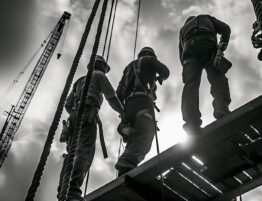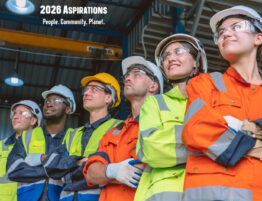
Over the past few weeks, we’ve turned our attention to the thousands of young people who are (or soon will be) contemplating their exam results and asking the question: what next?
We’ve already looked at bricklaying and roofing – two careers that are in high demand and can offer brilliant long-term prospects. But for a young person just starting out, the construction sector literally has hundreds of other opportunities. To conclude our What’s Next series, this week’s blog explores some of those options.
Hands-on trades
For those who enjoy building, making and being outdoors, construction offers a whole host of practical, skilled trades beyond bricklaying and roofing. Hands-on careers include:
- Carpentry and joinery – Carpenters and joiners shape and fit wood for everything from staircases and doors to flooring and furniture. It’s a trade that demands precision and creativity, with opportunities to specialise in areas like heritage restoration or bespoke interiors.
- Plumbing and heating – From fitting bathrooms and kitchens to installing heating systems and renewable technologies, plumbers and heating engineers are always in demand. This role suits those who like solving problems and working with both their hands and their heads.
- Electrical installation – Electricians are essential for keeping buildings powered and safe. Work can include everything from household wiring to large commercial systems, as well as installing cutting-edge smart technology and renewable energy systems.
- Plastering and drylining – Plasterers and dryliners create smooth walls and ceilings, or fit partitions that shape how spaces are used. It’s detailed work that transforms a bare building into a usable environment.
- Painting and decorating – Decorators bring the final finish to buildings, combining technical know-how with an eye for design. It’s a career that allows you to see the impact of your work every day.
- Plant and machinery operation – For those who like big machines, roles such as digger or crane operators are vital on construction sites. These require specialist training but offer responsibility and variety.
Could this be right for you?
If you like being outdoors, staying active, learning on the job and seeing visible results from your efforts, one of these trades could be your perfect fit.
Technical, professional and support roles

Not every career in construction involves being ‘on the tools.’ Many roles are about planning, designing, problem-solving and supporting projects from behind the scenes. Here are some of those options:
- Surveying – Quantity Surveyors, Building Surveyors and Land Surveyors ensure projects are cost-effective, compliant and well-managed. They combine technical knowledge with financial oversight.
- Civil engineering and technicians – These roles support engineers in designing and delivering infrastructure — from bridges and roads to schools and hospitals.
- Architects – Creative problem-solvers who design buildings and spaces, balancing visual appeal with technical, safety and regulatory requirements.
- CAD and BIM technicians – Using digital tools and 3D modelling software, these professionals turn concepts into construction-ready designs.
- Project and site management – Every site needs leaders to coordinate people, budgets and schedules. Project managers and site managers keep everything on track.
- Health and Safety professionals – With strict regulations to follow, Health and Safety Officers make sure that sites are compliant and safe for everyone who works on them.
- Environmental and sustainability roles – As construction embraces greener methods, specialists are needed to advise on waste management, biodiversity, eco-materials and compliance with sustainability targets.
- Office and commercial roles – Behind the scenes, roles like estimating, accountancy, marketing and administration keep the wheels of a construction business turning.
Could this be right for you?
If you enjoy problem-solving, planning and organising, working with technology, being creative or leading teams, one of these roles might be the path you follow.
How to get started
The good news is there are multiple entry points into a career in construction. Each role has different requirements, but here are some of the options:
- Apprenticeships – Earn while you learn and gain recognised qualifications.
- College courses – NVQs or diplomas in specific trades.
- Going straight into a job – For example, starting as a labourer on site or an office junior and building up skills on the job.
- University or graduate schemes – The usual requirement for more technical and professional pathways.
Whatever your starting point, construction offers opportunities to grow, specialise and progress.
Finding your path
From skilled trades like carpentry and electrics to technical roles in surveying or digital design, construction really does have something for everyone. With demand for workers higher than ever, now is the time to think about which path matches your strengths and interests.
Don’t forget that both bricklaying and roofing also offer excellent prospects – so take another look at our previous What’s Next blogs to find out more about each of these roles:
- What next – could bricklaying be for you?
- What next – could roofing be the career you’re looking for?
Call out to Sheriff team: Share what you enjoy about your role in construction by commenting on our Facebook or LinkedIn pages.
19.08.2025
Feature image: Freepik
Other image: Rawpixel/Shutterstock.com








